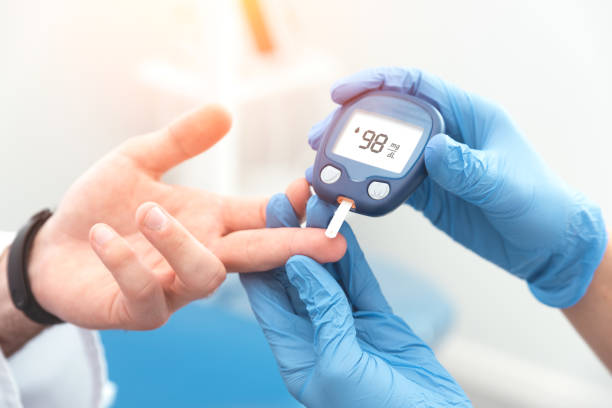What Is The Connection Between Diabetes And Cardiovascular Disease? – Dr. Kahlon
Overview
Type 2 diabetes and cardiovascular disease are deeply interconnected health issues that significantly impact individuals’ overall well-being. This article delves into the shared risk factors, such as obesity and sedentary lifestyle, and explains how insulin resistance in diabetes leads to cardiovascular complications like atherosclerosis and heart attacks. Effective management strategies, including lifestyle modifications and regular health screenings, are essential to mitigate these risks. Learn how addressing these factors can improve your health and potentially prevent these serious conditions.

Introduction
Type 2 diabetes and cardiovascular disease are two major health concerns that often intersect, creating a significant impact on individuals’ health. This article explores the intricate link between Type 2 diabetes and cardiovascular disease, emphasizing the importance of comprehensive management strategies to mitigate these risks.
Shared Risk Factors
Type 2 diabetes and cardiovascular disease share numerous risk factors, which can increase the likelihood of developing both conditions. Key shared risk factors include:
- Obesity
- Sedentary lifestyle
- Poor dietary choices
These factors contribute to insulin resistance, a hallmark of Type 2 diabetes, and simultaneously elevate the risk of cardiovascular issues such as hypertension and high cholesterol. Addressing these shared risk factors is crucial for breaking the link between these two health challenges.
Insulin Resistance and Cardiovascular Impact
The Role of Insulin Resistance
Insulin resistance, a defining feature of Type 2 diabetes, significantly contributes to cardiovascular complications. When the body becomes resistant to insulin, blood glucose levels rise, leading to:
- Inflammation
- Vascular damage
Over time, this damage promotes the development of atherosclerosis (the buildup of plaque in arteries), which increases the risk of heart attacks, strokes, and other cardiovascular events.

Chronic Inflammation’s Role
Inflammation and Heart Disease
Both Type 2 diabetes and heart disease are associated with chronic inflammation. Elevated blood sugar levels in diabetes contribute to systemic inflammation, which accelerates the progression of atherosclerosis. This inflammatory environment is detrimental to cardiovascular health, fostering the development and progression of heart disease.
Managing the Dual Challenge
Comprehensive Management Strategies
Effectively managing the link between Type 2 diabetes and cardiovascular disease requires a multidimensional approach:
- Lifestyle Modifications: Regular physical activity and a heart-healthy diet are crucial.
- Medications: Prescriptions targeting blood glucose, blood pressure, and cholesterol levels are often necessary.
Regular Monitoring and Screening
Given the close relationship between Type 2 diabetes and cardiovascular disease, regular monitoring and screening are essential. Individuals with diabetes should have routine assessments of their cardiovascular health, including:
- Blood pressure checks
- Cholesterol screenings
- Assessments for other risk factors
Early detection and intervention can significantly reduce the risk of developing or worsening heart disease in individuals with Type 2 diabetes.
Frequently Asked Questions:
What connection is there between Type 2 Diabetes and Heart Health?
Type 2 diabetes and heart health are closely linked. High blood sugar levels in diabetes can damage blood vessels and nerves that control the heart, leading to an increased risk of cardiovascular diseases like heart attack, stroke, and hypertension. Managing blood sugar levels effectively can help reduce the risk of heart-related complications.
What are Risk Factors for Cardiovascular Disease and Type 2 Diabetes?
Common risk factors for both cardiovascular disease and Type 2 diabetes include:
- Obesity
- Sedentary lifestyle
- Poor diet
- High blood pressure
- High cholesterol
- Smoking
- Family history
- Age
Addressing these risk factors through lifestyle changes can significantly reduce the risk of developing both conditions.
What is the Relationship Between Diabetes and Vascular Disease?
Diabetes, especially Type 2, can lead to vascular disease by promoting inflammation and the buildup of fatty deposits in blood vessels (atherosclerosis). This process can narrow and harden arteries, restricting blood flow and increasing the risk of heart attacks, strokes, and peripheral artery disease.
How Does Type 2 Diabetes Cause Heart Failure?
Type 2 diabetes can lead to heart failure through several mechanisms:
- Hypertension: High blood pressure damages heart muscles over time.
- Atherosclerosis: Plaque buildup can restrict blood flow to the heart.
- Diabetic Cardiomyopathy: Direct damage to heart muscle cells due to high blood sugar levels.
What is the Cause of Cardiovascular Disease?
Cardiovascular disease is caused by a combination of factors, including:
- Atherosclerosis: Buildup of plaque in the arteries.
- Hypertension: High blood pressure damaging blood vessels.
- Lifestyle Factors: Poor diet, lack of exercise, smoking, and excessive alcohol intake.
- Genetics: Family history of heart disease.
Relationship Between Diabetes and Heart Disease
Diabetes and heart disease are interrelated conditions. High blood sugar levels in diabetes cause damage to blood vessels, increasing the risk of heart disease. Additionally, shared risk factors like obesity and hypertension further exacerbate the connection.
Diabetes and Cardiovascular Disease PDF
For comprehensive information, download this informative ebook, Diabetes and Cardiovascular Disease PDF. This guide provides detailed insights into managing these conditions.
Life Expectancy with Heart Disease and Diabetes
Life expectancy can be affected by both heart disease and diabetes, but effective management of blood sugar levels, blood pressure, and lifestyle changes can improve outcomes significantly. Regular check-ups and adherence to treatment plans are crucial.
Prevalence of Cardiovascular Disease in Type 2 Diabetes
The prevalence of cardiovascular disease is higher in individuals with Type 2 diabetes due to shared risk factors and the impact of high blood sugar on blood vessels. Studies indicate that people with diabetes are 2-4 times more likely to develop cardiovascular disease.
Diabetic Heart Attack Symptoms
Heart attack symptoms in diabetics may include:
- Chest pain or discomfort
- Shortness of breath
- Fatigue
- Nausea
- Sweating
Diabetics may experience atypical symptoms, so it’s important to seek medical attention if any unusual symptoms occur.
Increases Risks for Cardiovascular Diseases and Type 2 Diabetes Quizlet
Utilize resources like Quizlet to learn more about the risk factors and management strategies for cardiovascular diseases and Type 2 diabetes.
Which Type of Heart Failure is Commonly Associated with Diabetes?
Diabetes is commonly associated with Diastolic Heart Failure, where the heart has difficulty relaxing and filling with blood. This type of heart failure is prevalent due to the stiffening of heart tissues caused by high blood sugar levels.
Are Diabetes and Heart Failure Related?
Yes, diabetes and heart failure are related. Diabetes increases the risk of heart failure due to the damage caused by high blood sugar levels to blood vessels and heart muscles, leading to complications like hypertension and atherosclerosis.
Does High Cholesterol Cause Diabetes?
While high cholesterol does not directly cause diabetes, it is a significant risk factor for cardiovascular complications in individuals with diabetes. Managing cholesterol levels is essential for reducing the overall risk of heart disease in diabetics.
How Long Can You Live with Heart Disease and Diabetes?
Life expectancy with heart disease and diabetes varies based on individual health, management of conditions, and lifestyle choices. With proper medical care and lifestyle changes, many people live long, healthy lives despite having these conditions.
How Does Diabetes Cause Heart Disease?
Diabetes causes heart disease through:
- High blood sugar levels: Leading to inflammation and damage to blood vessels.
- Insulin resistance: Contributing to hypertension and high cholesterol.
- Atherosclerosis: Plaque buildup in arteries restricting blood flow.
Diabetes and Cardiovascular Disease Statistics
Current statistics indicate that people with diabetes are 2-4 times more likely to develop cardiovascular disease than those without diabetes. Cardiovascular complications are a leading cause of death in individuals with diabetes.
Type 1 Diabetes and Heart Disease
Type 1 diabetes also increases the risk of heart disease due to similar factors such as high blood sugar levels and insulin resistance. Proper management and regular check-ups are crucial for minimizing heart disease risk.
Diabetes and Cardiovascular Disease: Pathophysiology
The pathophysiology involves:
- Hyperglycemia-induced damage: To blood vessels and heart tissues.
- Insulin resistance: Leading to hypertension and dyslipidemia.
- Inflammation: Promoting atherosclerosis and cardiovascular complications.
Type 1 Diabetes Heart Attack Symptoms
Heart attack symptoms in individuals with Type 1 diabetes may include:
- Chest pain or pressure
- Shortness of breath
- Nausea or vomiting
- Fatigue
As with Type 2 diabetes, atypical symptoms are common, necessitating prompt medical attention.
Chest Pain & Diabetes Type 2
Chest pain in individuals with Type 2 diabetes can indicate cardiovascular issues such as angina or heart attack. Given the increased risk, any chest pain should be evaluated by a healthcare professional immediately.
Read the full article: Type 2 Diabetes and Silent Heart Attacks
Key Takeaway
The connection between Type 2 diabetes and cardiovascular disease highlights the need for a holistic health approach. By addressing shared risk factors, managing insulin resistance, and actively monitoring cardiovascular health, individuals can better navigate the challenges posed by these conditions. Empowering individuals with knowledge about this connection is a crucial step in fostering a proactive approach to health and well-being.
Ketogenic Diet: A Potential Solution
Reducing sugars and carbohydrates can be an effective way to prevent and possibly reverse Type 2 diabetes. The ketogenic diet, a high-fat, moderate-protein eating plan, aims to shift the body into a state of ketosis, where it primarily burns fat for fuel instead of carbohydrates. Benefits of the ketogenic diet include:
- Weight loss
- Stabilized blood sugar levels
- Enhanced mental clarity
For more information about the ketogenic diet and recipes, visit: Ketogenic Diet 101
By addressing the shared risk factors, managing insulin resistance, and maintaining regular health screenings, you can significantly reduce the risks associated with Type 2 diabetes and cardiovascular disease.
Service Recommendation: Fast Private and Affordable Lab Testing with HealthLabs. This Includes Cardiac Health, Cholesterol and Diabetic Testing. No Doctor’s Referral or Insurance Necessary.



